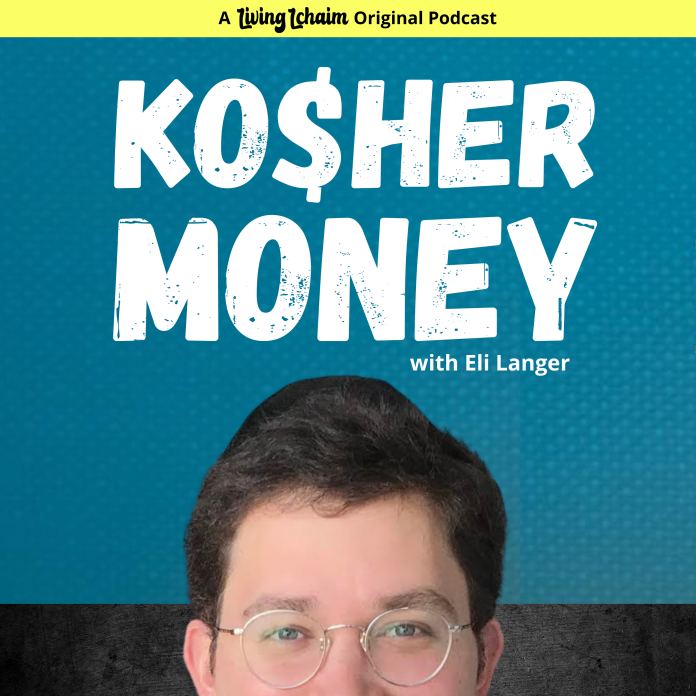After 3 million views, I’ve been asked to pen what I’ve learned from Kosher Money, a Living Lchaim podcast that I hope is helping Orthodox Jews earn, save, invest and manage their money.
We’ve recorded and released 25 episodes, so here’s a little nugget from each episode.
1) The median income of a typical American couple is $68,000, according to data reviewed by Living Smarter Jewish’s Zevy Wolman. If you’re earning more than that, you’re earning more than the average couple in America. Pat on the back!
2) Credit cards are dangerous and can only be used as a convenience tool, opines Rabbi Naftali Horowitz, financial advisor to millionaires. Using a credit card means your using tomorrow’s money today and if you can’t pay it off IN FULL at the end of the month then get rid of them.
3) Like anything in the world, lean on Hashem when you are searching for something. Davening before going to work isn’t a separate act, but an integral part of the entire day, says Rabbi Moshe Hauer. “The more you make God a part of our lives, the more he is.”
4) Be careful with Amazon purchases as those can add up quickly, especially with a mobile device and app so easily accessible. Be conscious of an actual budget so you aren’t left with a surprise bill at the end of the month, advises Simi Mandelbaum, the only Orthodox Jewish certified financial therapist in the US.
5) Managing money well is a problem for many people. What many don’t realize is that financial stress can take a major toll on your mental health, too. If you’d like a free referral to speak to a professional, don’t hesitate to call ReliefHelp.org – you deserve it.
6) Life insurance isn’t exciting to talk about, but it’s critical for every family to have. Additionally, each family needs a sufficient amount of life insurance, says Yoel Bodek. Term life insurance isn’t as expensive as people think. Visit JLIPN.org which is a free tool that’ll help you estimate the amount of life insurance coverage you need to take care of your family.
7) Want a high-paying job? Career consultant Ned Schoenfeld says there’s a nice Jewish couple in Lakewood making over $500,000 annually advising couples with their insurance-related questions. Maybe that job isn’t for you, but there are many career options out there, so do your research.
8) The majority of a private school’s costs are salaries, which can range from 78% to 82%, reveals Rabbi Heshy Glass, the founding national chairman of the Consortium of Jewish Day Schools and a longtime educator. There’s very little government intervention when it comes to salaries, which is partly why the cost of private school tuition is what it is.
9) There’s a woman in the Five Towns who will meet with couples for free to look over their finances and help them create a budget. Achiezer’s Stacey Zrihen has met with hundreds, if not thousands, of couples and is extremely helpful. I highly recommend it!
10) Not sure which subscriptions you’re paying for? Download the TrueBill app and it’ll track your monthly subscriptions. It’s free for 7 days, so don’t forget to cancel if you don’t need it any longer than that. 🙂
11) If you’re starting a new business with a partner, it doesn’t mean it should be a 50-50 partnership! If you’re doing more work than your partner it’s important to have that tough conversation before you get going or you’ll be looking at a much tougher conversation years into the business, advises Dean Noam Wasserman of YU’s business school.
12) Buying a home is one of the most expensive purchases one will make in their life. Doing it correctly and knowing the ins and outs can save you a ton of headaches. If you’re not almost 100% sure you can pay your mortgage off in 15 years, CrossCountry Mortgage’s Evan Tempelman says you should go for the 30-year option.
13) How many people in the past year picked up a phone and asked their Rabbi a business-related question? We are very careful when it comes to Kashrus, but are we equally as careful with money and the halachos surrounding it? Rabbi Yosef Kushner recommends we keep this top of mind.
14) The transition from Kollel and Yeshiva to work is very difficult as it’s a shift in identity, world view and daily activities, but it does sort out over time, says Dr. Tzvi Piritunsky. Don’t fret as you will adjust. Dr. Piritunsky coaches people through the transition, so don’t be afraid to lean on others for guidance!
15) Take note of the things you spend money on and which of those things actually make you happier, warns Dovid Bashevkin. No, seriously, stop and think. If it’s not bringing value to your life, stop wasting money and time on those things.
16) Just 3% of Americans are Jewish, yet over 25% of the Forbes 400 are Jewish. Why is that? Why do Jews have a tendency to prosper beyond the population in every setting they’ve ever been in throughout history? Our guest, Rabbi Daniel Lapin, lists 10 reasons in his book Thou Shall Prosper, while he debunks four erroneous possibilities. We discussed a couple of the reasons in Episode 16.
17) Building a business has roadbumps, so expect those as you set out on the entrepreneurial journey. That said, know when to pivot and don’t throw good money after bad.
18) For every one person who made money on, say, Bitcoin, there are 99 other people who lost money. It’s called survivorship bias, says Eli Fried. We tend to hear the glowing reports of survivors and those who “made it,” but we rarely hear about those who perished on the battlefields. Be careful when considering to act on a stock tip in the coffee room…
19) The goal of an interview is to get someone to like you in a short amount of time, reveals Andrew Singer, VP at a Fortune 100 company. If they don’t like you after a brief interview, you’ve failed.
20) The only difference between being wealthy and being poor is that you meet different people. If you’re rich, you meet certain kinds of people; if you’re poor, you meet a different kind of people. Your wealth or your poverty takes you where you can do the most good in God’s plan, says Rabbi Manis Friedman. Look beyond the dollar.
21) What happens when a good person allegedly makes bad choices and is now facing legal troubles in the form of, say, a subpoena? Don’t ignore it! Pick up the phone and call a trusted someone – it could be a rabbi, a community leader, or a lawyer, advises Avi Schick. Get some guidance and be proactive. (And no, the feds are most probably not listening to your phone calls – you’re just not that interesting.)
22) Healthshare plans are worth looking into and researching. It’s not a substitute for health insurance, though Carey Gruenbaum, health insurance expert, was not completely opposed to the model, which was eye-opening to us. Hey, learn new things every day, right? (Health-share plans are cooperatives – often faith-based – with members agreeing to cover a certain portion of each other’s medical costs. That sounds a lot like insurance, but there are important legal and practical differences.)
23) Investing can be fun, but it can also be emotionally challenging. If you want to invest and stop yourself from making mistakes, it’s important to have someone in your life that can serve as a voice of reason, says returning guest Rabbi Naftali Horowitz.
24) Want a killer resume? You can pay a professional resume writer to create it for you! You’ll speak with someone about your career accomplishments and they’ll gloss it up for you, says Mitchell Eisenberger. (That’s one way to get an interview off on a good start!)
25) There’s a fellow named Micha who created a YouTube channel just a year ago and now has over 20,000 subscribers. He explains to Hebrew speakers what’s happening in the stock market and he is making money doing it, both through YouTube ads and premium membership perks. It’s relatively easy to get started on YouTube, so don’t discount that as a revenue-generating side hustle!
Check out the episode below featuring Zevi Wolman.
Kosher Money is available to listen to on all podcast apps. You can watch episodes on YouTube. If you have a question or suggestion, hit the team up at [email protected]















![Livestream: Emergency Tehillim & Chizuk by R’ Krohn [Chazaq]](https://5townscentral.com/wp-content/uploads/2024/04/chazq-11-100x70.jpg)
